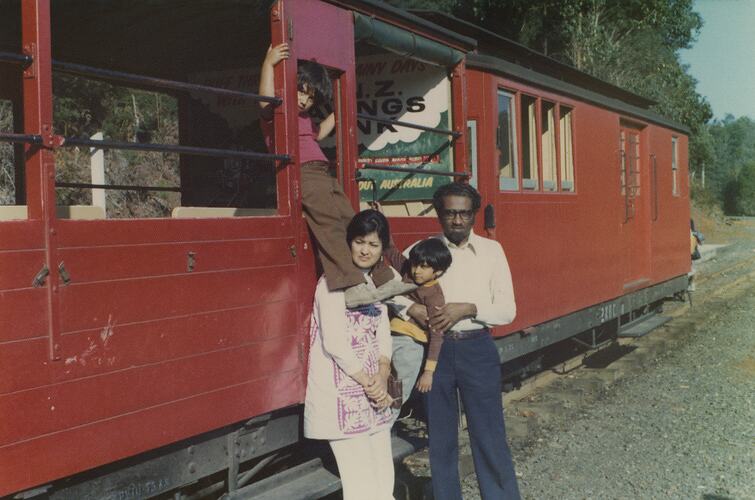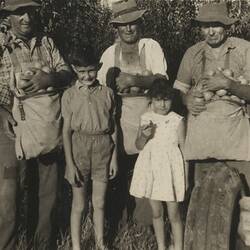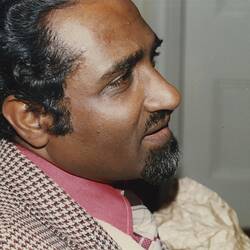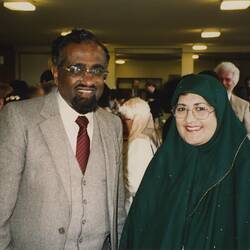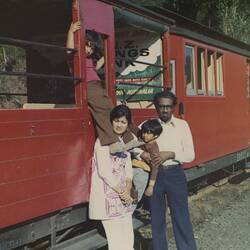Summary
Dr Abdul Khaliq Kazi, a Pakistani Muslim, migrated from Karachi to Australia with his wife, in 1961.
In 1961 Dr Abdul Khaliq Kazi, a Pakistani Muslim, together with his wife, came to Australia by Qantas, flying from Karachi with stops in Calcutta, Singapore and Darwin, finally arriving in Sydney. It was a small and slow aeroplane with only two propellers which stopped at the airports every four hours. From Sydney they travelled by train to Melbourne where they were welcomed by Professor John Bowman and his wife Margaret who brought Dr Kazi and his wife to their new home.
Dr Kazi was born in Karachi. After completing his studies in Pakistan, he spent three years at al-Azhar University, Cairo, studying Islamic theology. He holds a BA and PhD from the School of Oriental and African Studies, University of London. In cooperation between the University of Melbourne, the Myer Foundation, the Spalding Trust of Oxford and the Pakistan Government, Dr Kazi was offered a five-year contract to start an Arabic and Islamic Studies' program at the University of Melbourne. After that period, he stayed and worked in Australia. With Dr Kazi's academic engagement, Islamic studies would become recognised in his academic pursuits and also within the community.
At that time a Muslim academic coming to Australia was 'big news' so his arrival was published in the Herald newspaper. Only two months after his arrival in Melbourne he was contacted by the Muslim community in Victoria to conduct a funeral service for a Muslim who had recently passed away. The funeral service was held at an old Muslim section in the Fawkner cemetery where up to ten Muslims of diverse backgrounds attended. Soon Dr Kazi was introduced to a small multi-ethnic Muslim community in Victoria and they would congregate for prayers and Eid celebration at the Islamic Centre in Carlton where he also led a prayer congregation. Dr Kazi re-started the Sunday school at Metro in Russell Street, which took place every Sunday morning. At the same time, next door, 'there was a ballet class going in the next room and they would be playing ballet music, and we would be reciting Alhamdulillah!' [Praise be to God], said Dr Kazi. (Sachak, A., (n.d.) 'Profiles of Prominent Victorian Muslims: Abdul Khalik Kazi').
Within the early multi-ethnic Muslim community he met Jalal Deen, originally from India, Ibrahim Dellal, from Turkish Cyprus and Fehmi El-Imam, from Lebanon. Dr Kazi's name is woven into many worthy initiatives and achievements in the history of Islam not only in Victoria, but Australia. By bringing an Islamic spirit to the Muslim community in Victoria, Dr Kazi became chairman of the ICV in 1962. At a national level, together with Imam Ahmed Skaka, Ibrahim Dellal and Sheik Fehmi el-Imam, Dr Kazi was instrumental in establishing the Australian Federation of Islamic Societies (AFIS) in 1964 and was its chair for the first ten years. It was an initiative of the organisation aimed at bringing all Muslims together at state and national level and cooperating with Australian authorities. Since the 1960s Dr Kazi participated in numerous pioneering interfaith dialogues with people of Christian and Jewish faiths as part of an interfaith group. As a Muslim representative, Dr Kazi observed: 'We came and went; we met and talked in the Jewish Centre in Toorak'. As a Senior Lecturer in Islamic Studies at the Department of Middle Eastern Studies at the University of Melbourne, he was involved in the early interfaith activities with scholars of various faiths at the University. Dr Kazi also visited a number of Muslim countries, including Kuwait, The United Arab Republic, Saudi Arabia, Türkiye (formerly Turkey), Indonesia, Malaysia and Pakistan.
Before retiring, he spent a seven-year period working at the International Islamic Universities in Malaysia and Islamabad, Pakistan. He was also a visiting scholar at the American University of Beirut, Lebanon. For his worthy contribution he was awarded with the Order of Australia AM.
Based on Dzavid Haveric's interview with Dr Abdul Khaliq Kazi, 2017.
More Information
-
Keywords
-
Authors
-
Article types
